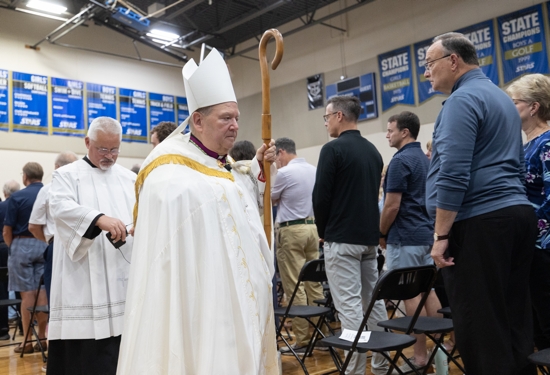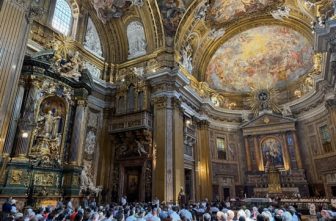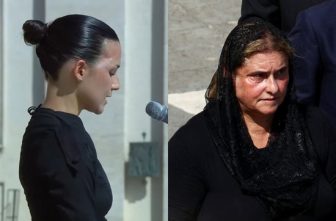
Editor’s note: The following interview with Archbishop Bernard Hebda took place Sept. 2 at the Archdiocesan Catholic Center in St. Paul. The interview appears in its entirety. It has been lightly edited for clarity.
Q) Archbishop, you have guided us through these really terrible, tragic days. How are you doing?
A) I feel really privileged to be here, even though it’s a very difficult time.
One of the beautiful parts of being the archbishop, or even being a pastor in a parish, is that people share so many stories with you. I’ve certainly experienced a great grief, in the families who are directly affected and also in our community at large. But I’ve also heard some really powerful stories of how it is that people have reached out to one another, how they’ve been instruments of God’s grace and love in the lives of others. I had the opportunity to hear about people speaking about the importance of forgiveness in situations like this.
And so, in the midst of the darkness, I’m already seeing some of those glimpses of light that Father (Dennis) Zehren spoke about in his beautiful homily on Saturday evening (Aug. 30). Certainly, it’s a time (that) calls us all to deeper prayer and reflection, but it’s, for me, been also a time where I’ve really had a sense of God’s presence, even in the midst of these difficulties.
Q) What about those times you’re alone?
A) It’s particularly in those times when I’m alone (that) I have that sense that the Lord has me here for a reason and that he’s been present with me personally, most especially as I’ve had the opportunity to hear those stories from others, and to reflect upon them, and to give God thanks for how it is that even in these really trying times that there are such wonderful signs of light.
One of those blessings has been (I’ve been) able to visit some of those in the hospital who were impacted. And just listening to them speak about their experiences, or where God has been in their trial, has been inspiring for me. When you’re told by a seventh grader about how important it was that she was able to pray in the ambulance on her way to the hospital, or when I had the chance to meet the young man who asked the doctor to pray before he operated on him — seeing that kind of faith, but also the tenderness that’s there.
And so even though it is such an awful time, that tenderness really speaks to the depth of our Catholic community and how it is that God really uses us to be able to be his presence in very difficult times.
Q) Have there have been things that have happened in your ministry that have prepared you for being in a place that is very difficult?
A) I think that there’s really been nothing that’s prepared me directly for what we experienced on Wednesday (Aug. 27) and what we’ve seen in these days since then. I know that my own grief is nothing in comparison to what the parents of Fletcher (Merkel) and Harper (Moyski) are experiencing or any of the families that send their kids to Annunciation or even the parishioners more broadly. I realize that my own experience is very different than theirs.
I do think that the Church makes sure that her priests, her shepherds, do engage in a life of prayer. We’re called to pray every day, we celebrate the Mass every day, and I think that that is really important for us as we go into, and face, the type of grief that we’re dealing with here. I think that’s been great preparation.
I do think that some of the experience with (the) sexual abuse crisis and especially meeting some of those victims-survivors who were just amazing men and women, who managed to be great disciples in spite of what they experienced, also gives me hope that, indeed, the Lord can bring healing into really difficult situations. I know the Lord’s capable of that. And I think that was a good part of Father’s Zehren’s message in the homilies this (past) weekend — I think that was wonderful preparation as well.
Before I came here, I was the coadjutor in Newark and our offices looked out from Newark onto the area where the World Trade Center had been. All of those employees at the Archdiocese of Newark were so aware, always, of what had happened at 9/11. At that time, I was in Rome so I didn’t have exactly the same kind of experience that they would have had. But I was always impressed in Newark by hearing of how it is that God has brought healing — (it) takes time. But God is so good in that way. Some of the parishes in Newark were really deeply affected — (there were) a good number of deaths from 9/11 — and they still managed to be such wonderful communities of faith.
Q) We are in this for the long haul in terms of recovery, for these victims, their families, the Annunciation parish and school, the broader community. What might we turn to, to help us in the long haul as we heal?
A) We’re so blessed with sacred Scripture and I think especially the Psalms give us those words sometimes when we’re not able to formulate cogent sentences or even express what’s in our heart to the Lord on our own. We can go to the Psalms and they give us an opportunity to really express what’s in our hearts. I think that’s a great blessing.
I do think that the Eucharist is going to be a great source of healing for us as well. I was delighted that so many people came to the old church at Annunciation on Saturday (Aug. 30) and Sunday (Aug. 31) and I think there’s something so powerful in coming together and having that opportunity to be nourished by the Eucharist, but also to see that in a particular way, as a re-presentation of Jesus’ sacrifice on Calvary. When we think about the fact that our God loved us so much that he took on human flesh — that’s what we celebrate in the Annunciation, for which the school and the parish are named — we have a God who desires to be with us, even in those difficult times, all the way to enduring death for us on the cross. … People all over this archdiocese and indeed all over the world, were celebrating the Eucharist this (past) weekend, and that’s a way in which we’re able to say, indeed, that Jesus has victory over sin and death, and that Jesus offers to us a share in his resurrection as well.
I really hope that that’s going to be a source of comfort for the families of Fletcher and Harper. And I hope that it’s something that really gives us, as a community, hope as we move forward as well.
Q) I think about our small groups that have been formed in light of the Archdiocesan Synod, and it seems that those might be a natural place to be together to discuss some of this, to be a support.
A) I love our small groups because they have a little bit of structure to them, but that (this structure) enables people to share in that way. A couple of groups have invited me to come and have a coffee with them or dessert with them, and they speak about how they’re able to talk about matters of great depth, things that they might not even normally share with their family. But somehow or another, in the context of a small group, they’re able to go very deep.
And this is a moment when I think all of us need to go deeper … there is something about people coming together and sharing.
I was so proud of our archdiocesan staff who helped facilitate an off-site welcome center for families from Annunciation and whether it be over a cup of coffee or whether it be as the kids were hugging baby bunnies, it’s an opportunity for people to come together and to begin that process of sharing what the experience was, and then also trying to figure out where was God in that and how it is that God’s calling us to an experience of love that’s going to bring healing.
Q) I think of Father Zehren’s homily and his summary seemed to be the Lord saying, “Now watch what I can do.”
A) That was superb. I think it was one of the finest homilies I’ve ever heard.
Q) It was amazing. And so, we’re watching for that, right? That light, that “now watch what I will do.” Are there people you turn to as you seek support in the midst of all of this tragedy?
A) I feel so blessed to have Bishop (Michael) Izen and Bishop (Kevin) Kenney, who are of course, wonderful first responders for me and they’ve been terrific. And the priests here as well; I had the opportunity yesterday to spend some time with maybe 15 or 20 priests, and that was really comforting for me. I have some good bishop friends, too, who made sure that they were checking in on me, and that’s been really positive.
It’s phenomenal, really, how it is that people all over the world are praying for us. When we received that message from Pope Leo (XIV), I was thrilled and amazed that they (at the Vatican) were able to do that so quickly and that we were able to share that then with our whole community at that first press conference (following the shooting). And then to hear him speak again in English at the Angelus on Sunday was particularly moving for me.
We’ve received emails and texts from all over the world: bishops in remote areas, communities that are gathering together to pray for the families at Annunciation, whether it be in Norway or Kenya or the Virgin Islands or in Rome, all of those places. I know that people are really lifting us up in prayer. And I certainly hope that the Annunciation families are feeling that (in) the same way that I am.
Q) One thing that you encouraged is: Pray for all concerned, including the shooter. And that can be hard. How might someone who can’t pray for that person, how might they approach prayer?
A) I would say a couple of things. One would be, to think about those times in our own lives when we felt very much alone and everything that I’ve come to read about the perpetrator, there certainly seems to be a great loneliness there. And then I think when we reflect on how it is that we’re all brothers and sisters in Christ, I think that that calls us to reflect also on what the shooter need(ed) and what the shooter’s experience might have been. When we think about the fact that the perpetrator came from a family and there have to be people that are loving and really in grief at this time — certainly with great sorrow for what was done, but also at that personal level, great grief; I think that helps us to have our hearts go out as well.
I think most especially, it’s that example of Jesus from the cross who even at the moment of greatest pain was able to say, “Father, forgive them, they know not what they do.” That kind of forgiveness.
Now, where do we get that? I remember it was 2006 — I’m from Pennsylvania — and there was a shooting in an Amish schoolhouse in the eastern part of Pennsylvania. And I remember being so moved when the Amish community had outreach to the family of the shooter. And offering not only their forgiveness, but also really trying to pray for the family, and even offering financial support and comfort to the family who had also lost their husband and father. It made an impression on me in 2006.
What is it that distinguishes what happened in Annunciation(‘s church) from what happens all the time in our United States? We hope it’s the way in which people are able to come together, but also, how it is that we might be a community of even greater love as we move through this.
Q) We pray for the perpetrator’s soul.
A) Yes, exactly.
Q) Is there anything else you’d like to share at this point with the archdiocese?
A) Just to say how grateful I am for the prayers that are coming from all of our parishes.
A recognition that there are parents and faithful all over our archdiocese who even though they’re not at Annunciation or directly connected, they’re still feeling a great pain. And I think that speaks to what our patron saint, Paul, tells us about the body of Christ: When one part of the body is hurting, the whole body hurts. We all feel that, and I know that that’s the case here in the archdiocese.
And just to look forward with Father Zehren to what it is that Jesus is going to be able to do now in the midst of this darkness; as we already see some of those glimmers of light, I trust that the Lord is going to do even greater things.



